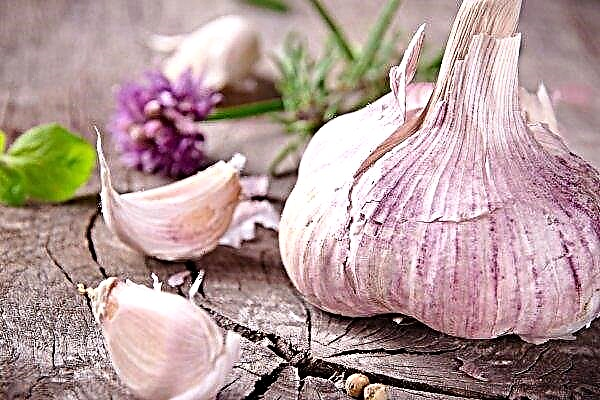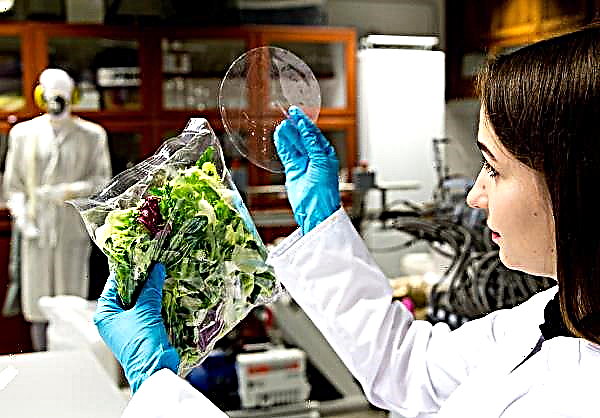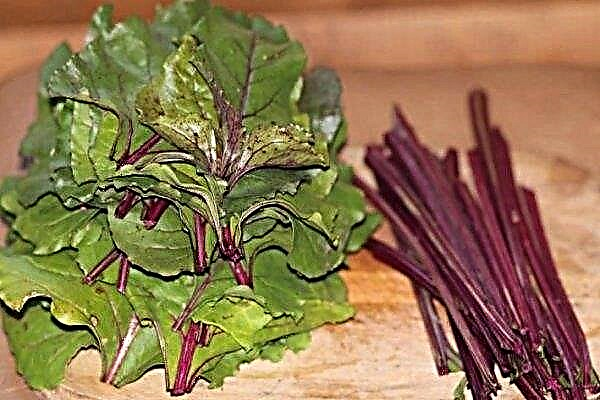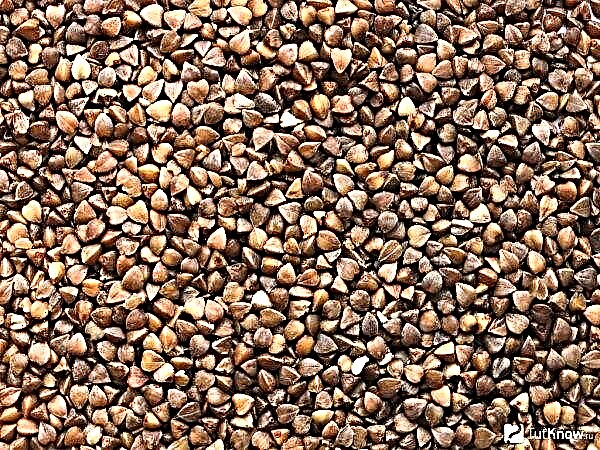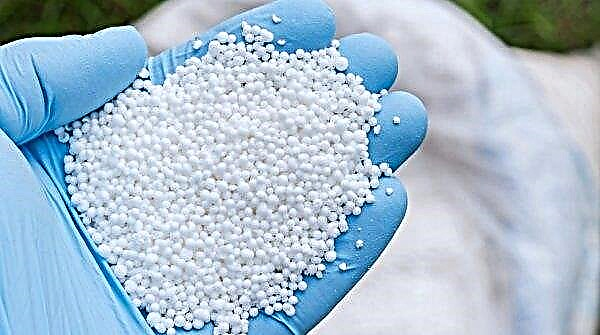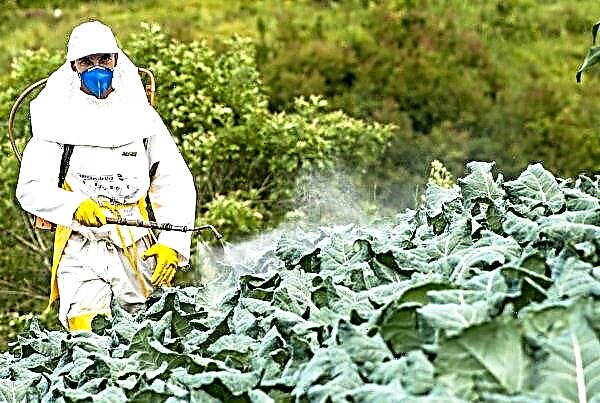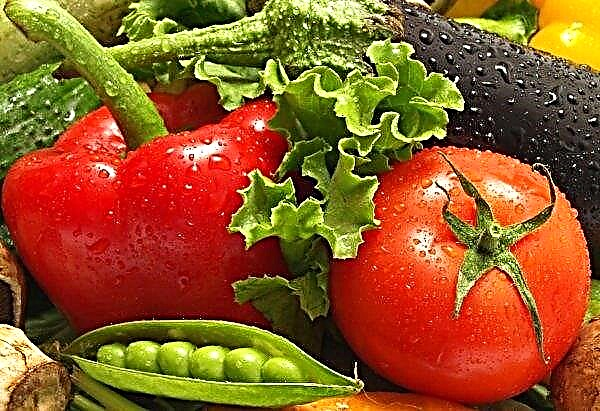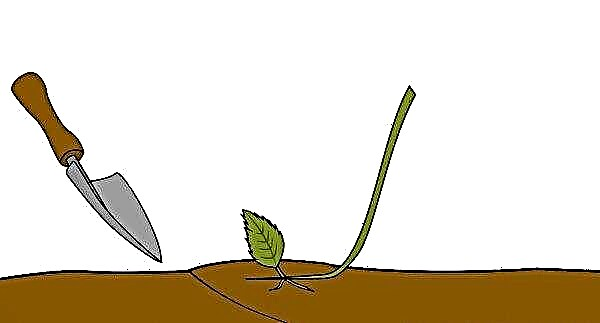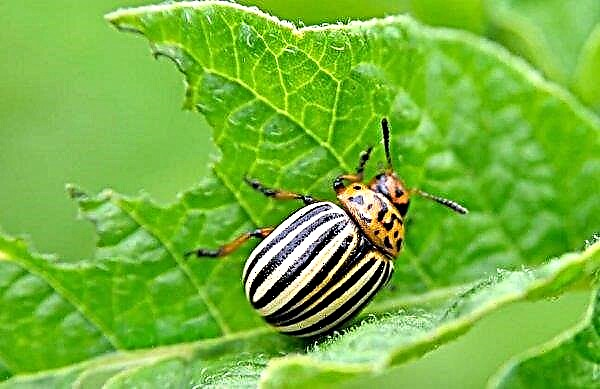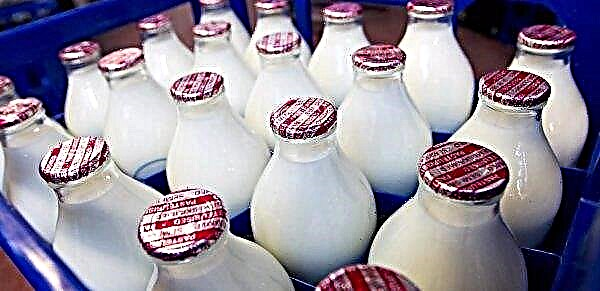You are engaged in farming - grow ducklings, invested a lot of money and effort in it, but one day you find that the kids are weakened, do not stay on their feet, somersault, lying on their backs. You panic because you don’t know how dangerous it is and what you can do about it. You can get acquainted with treatment options, find out the reason why this happens, from this article.
Diseases leading to death
To the fact that ducklings refuse legs, such diseases lead:
- aspergillosis;
- tuberculosis;
- hepatitis;
- goiter inflammation;
- pasteurellosis;
- salmonellosis.
Aspergillosis
Aspergillosis is a fungal disease that affects the respiratory organs of ducklings. It is transmitted through mildew-infected food, bedding, walls, mold spores, ducklings are inhaled with air.
The causes may be:
- poor quality feed;
- raw litter;
- the room is not ventilated.
- ducklings cannot stand up;
- greedily draw in air, can not breathe;
- the beak and paws become cyanotic.
- Acute - with pronounced symptoms (in most cases, ducklings die).
- Chronic - sluggishly current.
- sanitize the house and feeders;
- build ventilation holes;
- ventilate the room;
- change the litter;
- monitor the quality of feed.
Tuberculosis
Ducklings tuberculosis is a disease that is chronic in nature and affects:  Tuberculosis duck liver
Tuberculosis duck liver
- liver;
- spleen;
- kidneys
- lungs;
- pancreas, thyroid gland;
- Bone marrow;
- intestines.
Passed through:
- sick people;
- sick birds, their eggs and droppings;
- infected animals, insects, parasites, worms;
- infected litter, water, feed, land, farm equipment.
Symptoms of tuberculosis in ducks are as follows:
- exhaustion;
- disheveled feathers;
- a feeling of greasy and messy plumage;
- apathetic state;
- diarrhea;
- lameness;
- often notice that the kids are sitting on their feet;
- damage to the mucous membranes and skin;
- low fertility of eggs.
Important! The causative agent of tuberculosis remains active in water for up to 7 months, in manure for up to 5 years, in litter and land for up to 4 years, in buried carcasses of dead ducklings for up to a year, and when meat is frozen, for up to 2 years and 3 months.
Meat is subject to destruction, eggs are allowed to be added to small-sized baked goods, can be used for incubation on the farm itself, but such a bird is grown separately. The infected poultry house and equipment are treated with a 3% solution of formaldehyde and caustic alkali, a 20% suspension of freshly slaked and bleached lime (the specific gravity of chlorine is at least 5%) at the rate of 1 liter per 1 square meter. m
Hepatitis
Ducklings viral hepatitis is a disease characterized by viral damage to the liver, spleen, and brain.
There are 2 forms:
- Acute - lasts up to 3 days, more than half of the offspring die.
- Super-acute - up to 95% of the offspring die within an hour after the onset of symptoms.
Symptoms of the disease are pronounced, namely:
- apathy;
- lack of appetite;
- disorder of the nervous system;
- narrowing of the eyes;
- conjunctivitis;
- cramps
- babies fall to one side or on their back;
- move limbs as if swimming;
- paws wide apart;
- they die, throwing their heads back and stretching out their paws.
An infected bird secretes the virus through feces, eggs, and secretions from the nose and eyes, due to which they become infected:
- stern;
- litter;
- water;
- air.
In no case should:
- export eggs and meat to farms where there were no outbreaks of viral hepatitis;
- use the reservoir on which sick ducks swam until the expiration of 12 months;
- procure unvaccinated ducklings.
Goiter inflammation
The inflammatory process in the goiter (catarrh) begins when it becomes clogged with sticky, poor-quality or large, un-age food, inedible particles, due to lack of water. May result in death through asphyxiation.
The disease manifests itself through such signs:
- swollen goiter;
- a dry look in a sitting position;
- apathy
- gray discharge with a sour smell from the nostrils and beak;
- lack of appetite;
- frequent panting.
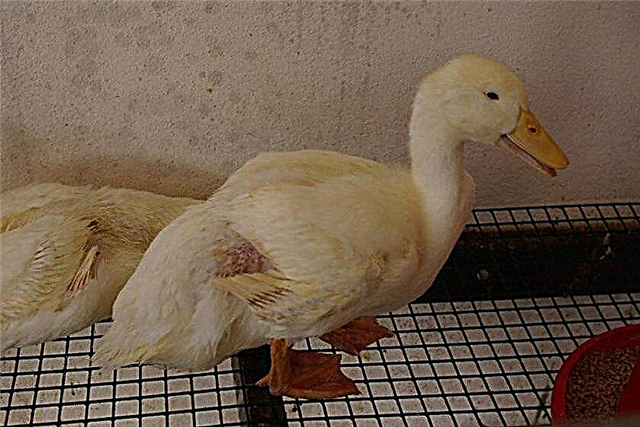 It will not be possible to treat the disease with medical means. Ducklings are turned upside down, holding wings and paws with something, and gently stroking the goiter, gently squeezing out the remnants of food.
It will not be possible to treat the disease with medical means. Ducklings are turned upside down, holding wings and paws with something, and gently stroking the goiter, gently squeezing out the remnants of food.Massage is repeated until the goiter is released. This day you do not need to feed the kids, do not give a lot of water either. The next day, exclude solid foods, give soft food in milk. Add 5% hydrochloric acid to water.
Did you know? The quacking of ducklings is never echoed.
Pasteurellosis
Pasteurellosis (or cholera) is an infectious disease that is epidemic in nature and is characterized by a high mortality rate. It is transmitted by airborne droplets or through mucus.
The main symptoms are named:
- ducklings fall on their paws;
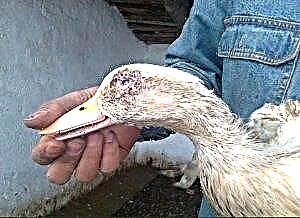 Festering duck eyes as one of the symptoms of pasteurellosis
Festering duck eyes as one of the symptoms of pasteurellosis - foul;
- they put the head under the wing or throw it on the back;
- wings hang;
- plumage ruffled;
- body temperature is elevated;
- lack of appetite;
- difficulty breathing, wheezing;
- eagerly drink water;
- mucus or foam flows from the beak;
- eyes fester;
- joints become inflamed;
- diarrhea with blood.
Depending on this, the disease is expressed in several forms, starting from a less pronounced and ending with a fatal outcome:
- Super sharp - ducklings fall, it is not clear why, and die; symptoms do not have time to manifest.
- Spicy - death occurs after 2-3 days, the symptoms are clearly visible.
- Chronic - mortality in babies is low, but they are exhausted and weakened; seals form on the head and under the beak.
Salmonellosis
Salmonella (or paratyphoid) in ducklings is an infectious disease that duck offspring can catch through the digestive system from an infected bird or animal vectors.
Symptoms that will help to recognize the disease:
 Discharge from the eyes of a duckling as a symptom of paratyphoid
Discharge from the eyes of a duckling as a symptom of paratyphoid
- In acute course - weakness, falling on the paws, diarrhea; birds do not want to eat and drink water eagerly.
- In a subacute course - purulent discharge from the nose and eyes, breathing is difficult, with wheezing, joints are inflamed.
- In a chronic course, the body is depleted, babies grow poorly, wings and legs move with difficulty.
- In case of a super-acute course, a fatal outcome without symptoms.
The diagnosis is based on bacteriological data. You can treat with antibiotics (Tetramycin, Synthomycin, Oxytetracycline, Sulfatrol and Furazolidone); as a result, a high level of costs, therefore, the offspring must be destroyed.
Important! Salmonellosis is one of the diseases dangerous to humans.
Parasitic infestations
Parasitic infestations (diseases by infection) are widespread.
Ducklings suffer from such parasites:
- worms;
- ticks;
- lice;
- down-eaters.

External manifestations of infection are:
- poor weight gain;
- significantly decreased appetite;
- weakness;
- dullness of plumage;
- in advanced cases - diarrhea.
They resort to the use of folk remedies:
- leeks;
- rose hips;
- pumpkin seeds;
- lingonberries;
- pomegranate seeds;
- walnuts;
- wild garlic;
- garlic.

Watch for symptoms of external parasite damage:
- the skin itches, ducklings scratch feathers;
- the appearance of plumage is getting worse;
- feathers may fall out;
- the kids look jaded.
To get rid of parasites, you need:
- baths with ash or sand;
- lime whitewash of the walls of the house;
- treatment of the house with 2% chlorophos or 0.3% karbofos;
- lubrication of plumage with a mixture of sulfur-mercury ointment with petroleum jelly;
- processing feathers with antiparasitic agents.
Malnutrition
An unbalanced diet or poor quality feed can lead to:
- vitamin deficiency;
- imbalance of macronutrients;
- deficiency of essential amino acids;
- food poisoning.
Avitaminosis
Vitamin deficiency occurs due to deficiency in ducklings of the main vitamins - B, E, D.
Vitamin B
If there is insufficient vitamin B in the diet, the nestlings deteriorate in the chicks and the nervous system is destroyed.
This is manifested in the following:
 Twisting the duckling paws as a symptom of vitamin deficiency
Twisting the duckling paws as a symptom of vitamin deficiency
- loss of appetite;
- growth impairment;
- throwing the head back;
- fall on paws;
- paralysis;
- twisting paws (if B2 is not enough);
- pallor of the skin (if B12 is not enough).
To get rid of the problem, you must include in the diet:
- yeast;
- corn;
- bran;
- greenery;
- dairy products;
- bone and fish meal;
- ready vitamins.
Vitamin E
The insufficient intake of vitamin E is indicated by:
- poor appetite;
- lethargy;
- cramps
- half asleep;
- limb failure;
- impaired coordination of movements.
Important! The lack of vitamins in ducklings prevents the cultivation of a healthy and highly productive adult poultry.
The solution can be:
- herbal flour;
- sprouted grain;
- vegetable fat;
- vegetables;
- supplemental feeding with vitamin E.
Vitamin D
A consequence of a lack of vitamin D in ducklings is rickets, in advanced cases - death.
Symptoms are immediately noticeable:
- chicks do not grow well;
- poorly gain weight;
- fall on their paws;
- the bones soften.

To fix the problem, you must:
- walk the birds;
- add fish oil and fish meal to the feed;
- add vitamin D in the finished form;
- feed the grain.
Macronutrient imbalance
The consequence of the lack of minerals in duck offspring is the level, Kashin-Bek, a disease that manifests itself in:
- plucking own plumage;
- using land, sand and sawdust as food.
The solution to the problem involves:
- adding limestone, iodized salt, bone meal to the diet;
- feeding of vitamin and mineral complexes.
Did you know? About 2 million ducklings are grown annually in China (despite the fact that their number is 2.7 million worldwide)
Essential Amino Acid Deficiency
Amino acid deficiency often occurs due to unbalanced feed and can cause underweight in babies, which subsequently affects the productivity of adult birds.
Most often missing:
- tryptophan;
- lysine;
- cystine;
- methionine.
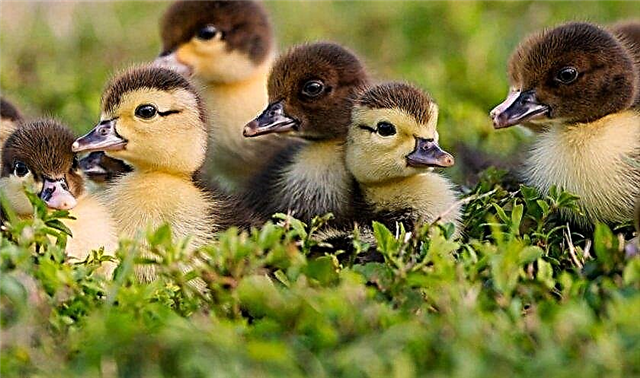
To exit the problem situation, add to the diet:
- fish, meat, bone meal;
- dairy products;
- meat waste;
- safflower or peanut meal;
- cotton seeds;
- cereals;
- in the early days - boiled eggs.
Poisoning
Poultry can easily be poisoned. This applies to both adults and young animals.
Ducklings can be poisoned:
- poisonous plants;
- pesticides;
- disinfectant residues;
- excess salt;
- moldy or rotten food.
Symptoms of this disorder:
- restless state;
- fall on paws;
- weakness;
- diarrhea;
- vomiting
- extended openings;
- refusal of food;
- plentiful drink.
How can I treat:
- Induce vomiting (using apomorphine).
- Rinse the stomach with water with a solution of tannin, Epsom salt, potassium permanganate.
- Purify with activated charcoal, burnt magnesia.
- Drink with linseed, oak, oat, sage broth.

- Feed fermented milk products, viscous feed.
- Give some castor or vegetable oil.
Content Errors
Wrong maintenance of ducklings is manifested in the following:
- non-compliance with the requirements for arranging a walking area;
- excessive landing density;
- poor microclimate.
Improper arrangement of the walking area
To the fact that the chicks do not stay on their feet, even problems on the walking platform can lead.
Among these problems, the presence in the territory is distinguished:
- fragments;
- prickly plants;
- acute-angled stones;
- snow.
 The walking area must be regularly cleaned, covered with litter in winter, and grassed in spring. High humidity also negatively affects health.
The walking area must be regularly cleaned, covered with litter in winter, and grassed in spring. High humidity also negatively affects health.
High fit
If the ducklings are crowded, they can trample each other's legs, the weaker ones will not be able to get to the feeders and eat normally, as a result, they weaken and do not rise to their feet.
Important! Do not plant more than 14 small and 7-8 matured ducklings per 1 sq. Km. m area of the house.
Climate mismatch to recommended standards
Optimum temperature, lack of drafts, fresh air protect kids from depletion.
Signs of a disturbed microclimate can be:
- chicks huddle or scatter in different directions;
- the beak is kept open;
- breathing heavily;
- move a little.
To solve the problem, you need:
- equip the house with heating so that the temperature is about 28 ° C;
- provide humidity at the level of 55-60%;
- Provide vents and windows, ventilate regularly;
- equip artificial lighting.
Prevention
To avoid the death of a bird, to prevent diseases it is necessary:
- It is good to think over the diet, combining different types of feed.
- Giving high quality feed.
- Store food as required.
- Monitor the cleanliness of the house and equipment, regularly disinfect and change the litter.
- Disinfect eggs for incubation.
- Buy eggs in well-maintained farms.
- Sow grass pad.
- Vaccinate the chicks.
- Do not allow infected people to care for the offspring.
- To isolate ducklings from adult ducks and from other birds and animals.
- Observe good hygiene practices.
- Inspect the chicks regularly.
- Infected babies isolate.
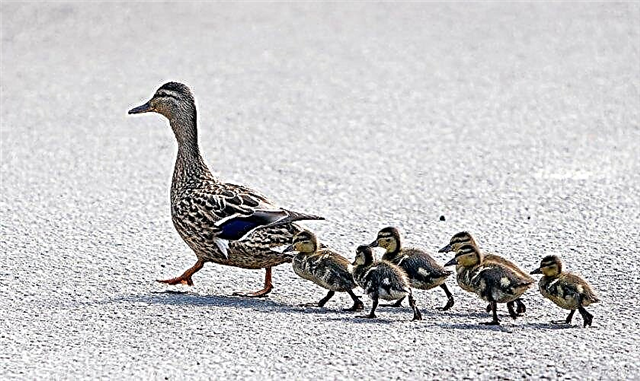 Now you know the reasons that cause ducklings to fall, and what to do in each case. Regardless of the cause, problems, it is better to prevent their occurrence and to observe preventive measures.
Now you know the reasons that cause ducklings to fall, and what to do in each case. Regardless of the cause, problems, it is better to prevent their occurrence and to observe preventive measures.

 Festering duck eyes as one of the symptoms of pasteurellosis
Festering duck eyes as one of the symptoms of pasteurellosis
